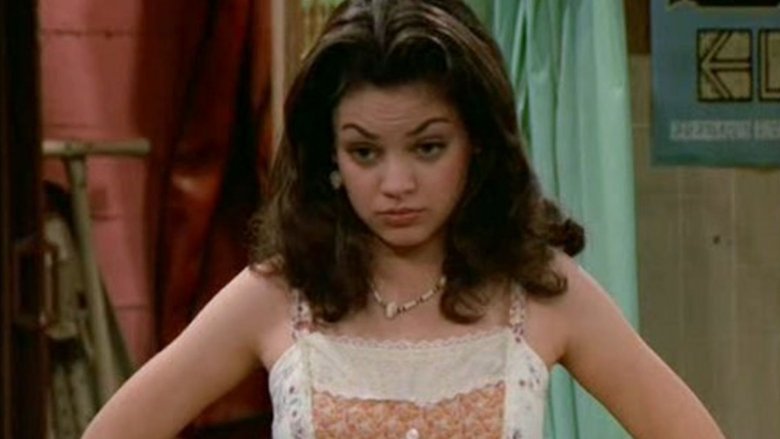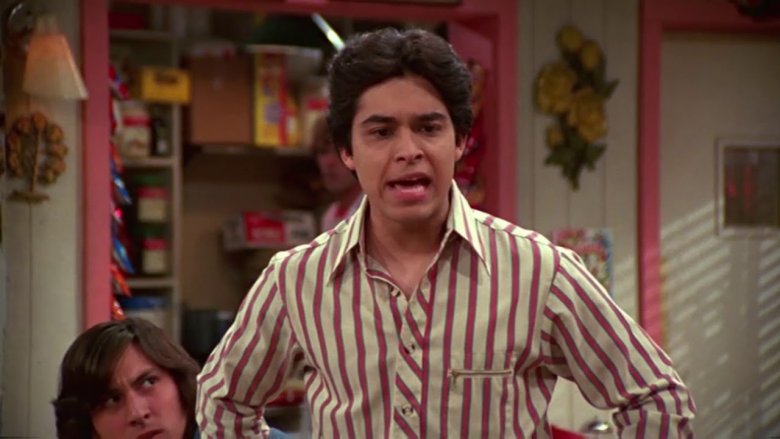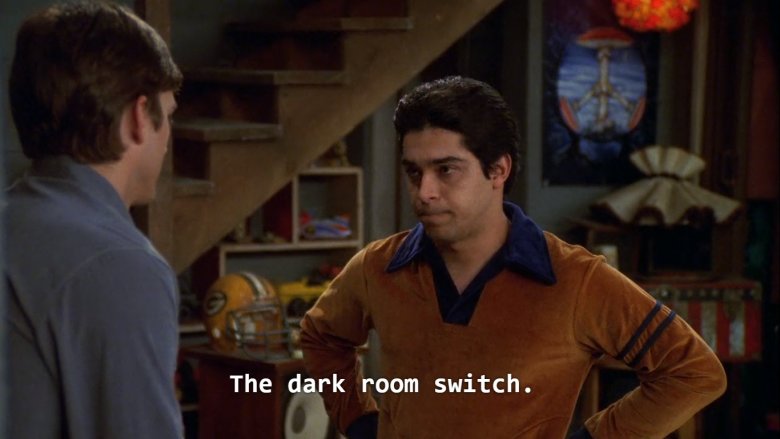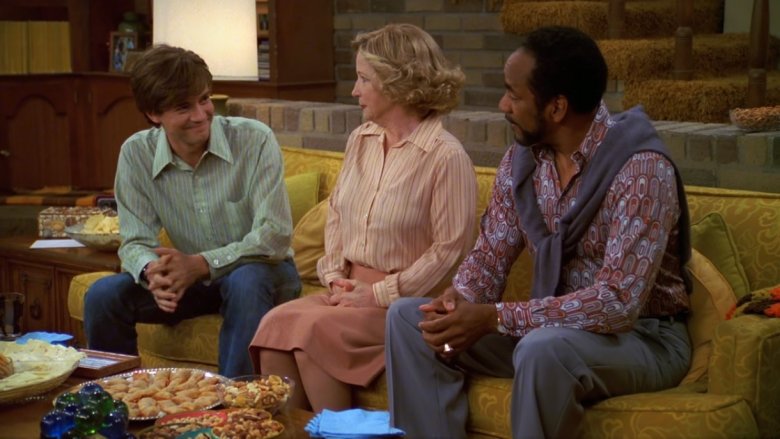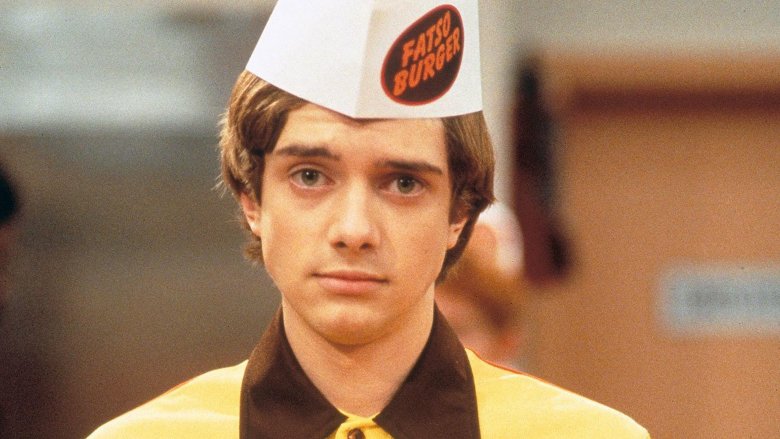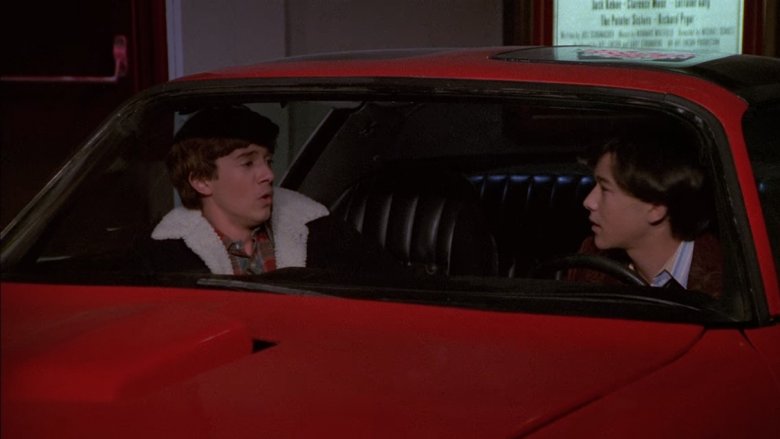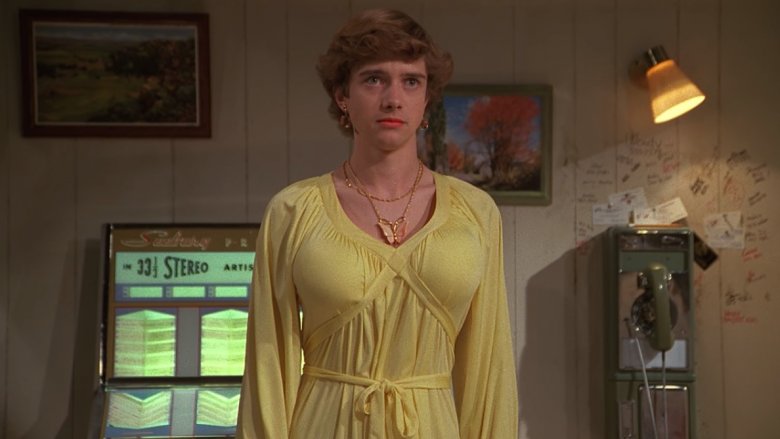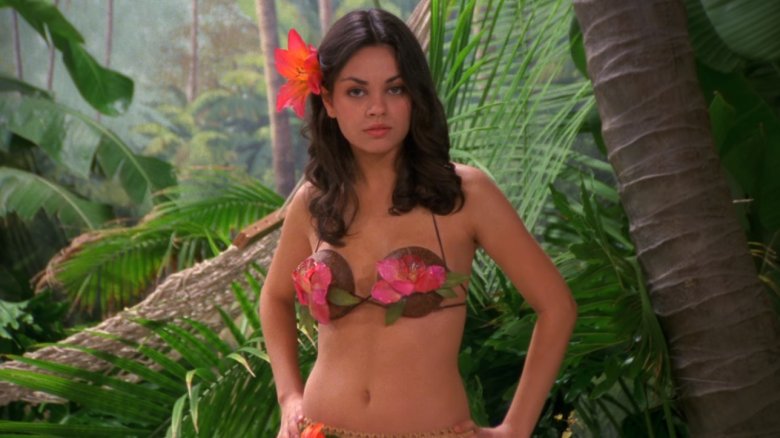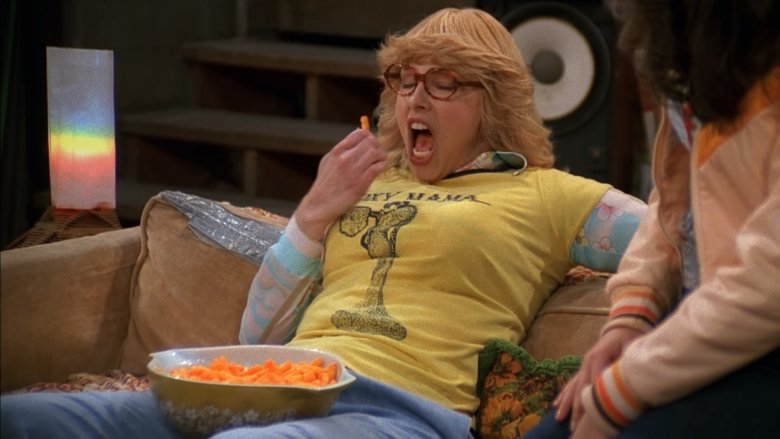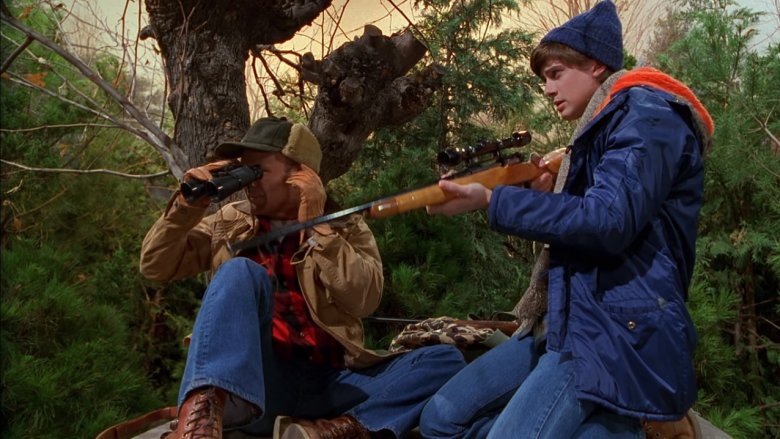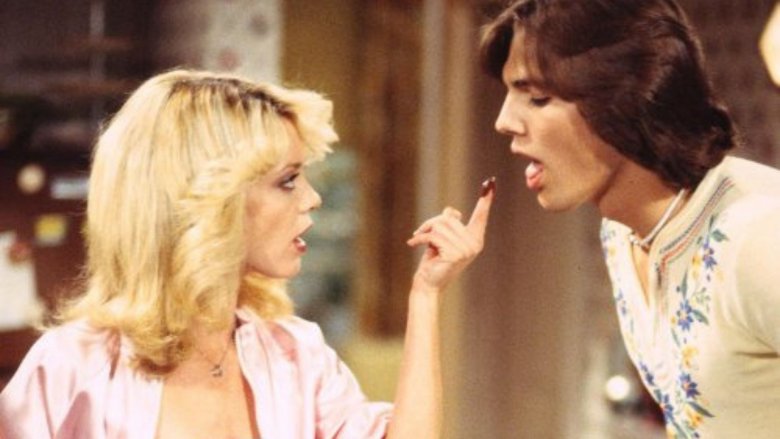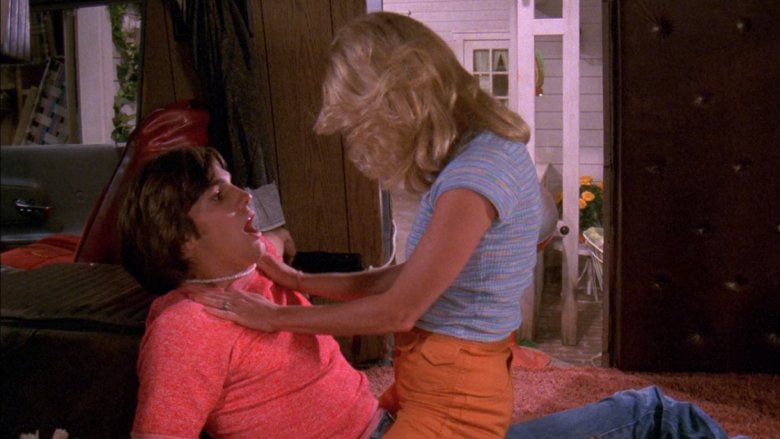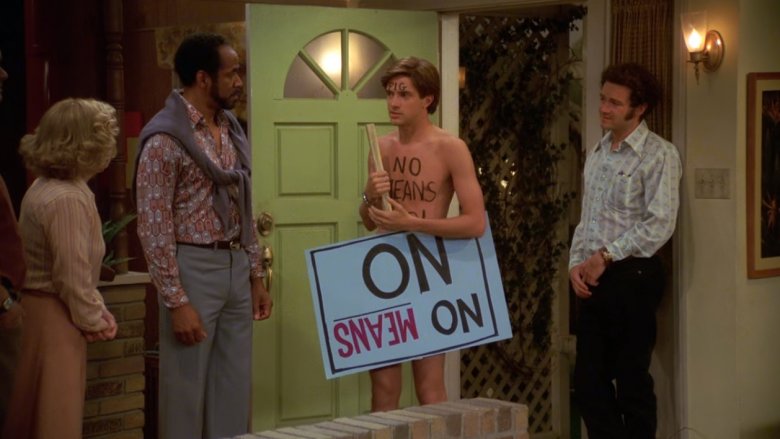Inappropriate That '70s Show Jokes That Wouldn't Be Accepted Today
Full of killer burns, easy to watch, and stacked with it's-that-guy! cameos, That '70s Show remains a breezy binge-watch option to throw on when you want to get away from the horrors of the modern world. Except it's sometimes too easy for the modern world to creep back in while you're watching, especially when there are certain jokes in That '70s Show that haven't aged well. If you haven't enjoyed a solid rewatch of the show for a while, then the fact that many of the jokes revolve around sexist, racist, and homophobic ideas can be a little jarring.
It's important to remember that many of these jokes are likely an attempt to reflect the attitudes of the '70s. But what they actually occasionally achieve is a reflection of just how many of these attitudes persisted in the late '90s and early '00s, when the show was on the air. If That '70s Show were to debut today, you can bet that none of these jokes would be accepted without a social media frenzy of protest.
Slam some Led Zeppelin in the eight-track and meet us in your parents' basement, because we need to talk about all the inappropriate That '70s Show jokes that wouldn't be accepted today.
Fez is a walking racist punchline
With a name that stands for Foreign Exchange Student, Fez's entire schtick throughout That '70s Show is just that he's mysteriously, and stereotypically, foreign. Dip into just about any episode and you'll find some and possibly all of the following jokes: Fez talks funny! Fez wants to be American but doesn't understand America! Fez is a perversely horny sexual predator! Fez has no money! Fez might get deported! Cue the laugh track, right?
His character plays into just about every heinous stereotype that persists about immigrants in America, and apparently that was totally cool to everyone in the late '90s. Part of that might be down to how conspicuously vague the show is regarding Fez's actual background. In doing so, the comedy slings cheap barbs at the character's general foreignness and avoids slinging specific barbs directly at actual nations, cultures, and communities. Because, you know, that would be racist.
With heightened sensitivity surrounding the rights of immigrants and the ways in which they're represented by the media, the episodic onslaught of jokes directed at how distinctly un-American Fez is would simply be inappropriate today.
Fez suggests he should sexually assault Angie
With modern movements like #MeToo and Time's Up heightening awareness about what consent is and definitely isn't, most people have at least a basic understanding of what constitutes sexual assault. For whatever reason, people were less clued up about it in the '90s, which might be why That '70s Show thought Fez suggesting he should rape Kelso's girlfriend is an unabashed laugh riot.
In the season 7 episode "2000 Light Years from Home," Kelso is struggling to figure out ways to break up with his girlfriend Angie. But it's fine because Fez has a great idea that apparently serves everyone's interests: Kelso will make love to Angie "in a dark room" and will excuse himself halfway through, at which point Fez will come in, pretend to be Kelso, and "finish the job." It's a real knee slapper of a joke, folks!
Because Kelso is six feet of stupid, he isn't in the least bit alarmed by his best friend's suggestion, but he's not convinced it'll help him either. "The dark room switch," as Fez confidently calls it as though this is a totally normal everyday thing, is thankfully not even attempted. However, it unfortunately wasn't the only time sexual assault was used as an inappropriate punchline on the show.
Hyde's heritage is played for laughs
Another season 7 clanger arrives during the episode "Let's Spend the Night Together," wherein Hyde finally meets his biological father and — try to contain your laughter — he turns out to be African-American. This results in a number of jokes at the expense of the Formans, who act like they've never met a black person before, but it feels less about poking fun at the Formans as it does having an opportunity to make jokes about race.
The absolute worst of these jokes come directly from Hyde, who revels in the newfound identity of his biological father. In a bid to convince his friends of the resemblance between himself and his father, he reels off a list of stereotypical jokes about African Americans and reasons that his dad's ethnicity explains a few things about him. Specifically, Hyde's "'fro" and his "suspicion of the Man." Awkwardly, he also makes an inappropriate crack about how his mother must have been relieved when he "came out white" at birth, so as not to arouse the suspicions of her white boyfriend at the time.
It's all made the more culturally insensitive by the fact that these jokes are being delivered by Danny Masterson, an actor who is very much Caucasian. Suffice it to say, these jokes sit especially uneasy at a time when the whitewashing of media is repeatedly being contested.
Eric's manliness is mocked
In recent years there's been a rising sentiment that people are sick of seeing masculine identity portrayed in a limiting, specific way. For decades, pop culture appeared to perpetuate the idea that boys could only truly become men once they transformed into rugged, emotionless brutes who chug beer, love sports, and never talk about their feelings or (heaven forbid) cry.
Throughout That '70s Show it's a running joke that because Eric is skinny, emotional, and intelligent on top of being a major nerd and bad at sports, he's somehow inferior to his male peers and less of a man. His dad calls him a sissy (a term that's definitely inappropriate today), his friends think it makes him easily "whipped" by his girlfriend Donna, and even she mocks his masculinity.
Obviously you can throw this one into the but-people-were-like-that-in-that-'70s pile, along with a few other outdated attitudes highlighted in the show, but That '70s Show rarely makes a point against this idea. And you know what? Eric might do dumb things sometimes, but he wasn't any less of a man because he was bad at basketball or cried about breaking up with Donna.
Eric is confronted by sexual stereotypes
The '70s were an incredible time for the LGBT movement. Following the Stonewall Riots of 1969, the early years of the decade saw fresh laws prohibiting queer discrimination, openly gay people like Harvey Milk were elected into political office, and homosexuality was removed from the list of psychiatric disorders. But you wouldn't know any of that from watching "Eric's Buddy," the one episode of That '70s Show which explores LGBT issues.
In it, Eric makes friends with a rich, popular kid called Buddy (Joseph Gordon Levitt) and the two enjoy a bromance for the ages — right up until Buddy makes an inappropriate move on his new pal which provokes nothing short of pure horror from Eric. The show treats Buddy's sexuality as a bombshell of a punchline, saving the reveal for well over the halfway point of the episode for maximum chuckles.
The episode's outdated approach means that Buddy's queerness is presented as stereotypically predatory, with another of the main punchlines centering around how Eric, who isn't traditionally masculine, is obviously confused for being a gay man by his new friend. Eric gets over his gay panic by the credits and decides to continue being Buddy's science partner, which is (cue applause) truly big of him.
Not only is the episode tokenistic, but it also woefully mishandles the representation of gay people during a critical period in their fight for equality.
Eric becomes a woman
You might be forgiven for thinking that an episode titled "Battle of the Sexists" would have at least a little self-awareness when addressing sexist attitudes. Sadly, you'd be wrong. In this episode, the ongoing inappropriate joke is that Eric is so deeply un-masculine that his girlfriend keeps beating him at sports. The only voice of reason concerning this attitude (which was archaic even for the '70s) is Kitty telling her son that sports with a romantic partner should be about having fun, not about winning. Or, you know, reinforcing gender stereotypes.
Regardless, the biggest punchline of the episode comes in the form of a fantasy sequence in which Eric is revealed to be a woman complete with a pretty dress, jewelry, and a face full of makeup after Donna unequivocally beats him at air hockey. It's a cheap joke that relies on the antiquated idea that women are the weaker and inferior gender.
But the worst part of the joke comes when Eric inexplicably grows a pair of breasts after agreeing that it's okay for Donna to beat him at sports, and it's seriously laughs galore. Sexist tropes aside, this joke rests especially uneasily at a time when gender politics (including those of the transgender and non-binary community) remain such hot topics of conversation. A throwaway punchline about the inferiority of a dude in a dress definitely wouldn't fly in the current climate.
Jackie's only valued for her looks
That '70s Show is full of inappropriate jokes that rely on the objectification of women. This is, after all, a show which features a point-of-view perspective of Eric ogling the breasts of his girlfriend's mom within just a few minutes of the pilot episode. The crux of this extended joke can be found in the season five episode "What is and What Should Never Be."
In it, Eric continues to be mortified that Hyde is dating Jackie, a girl he's found annoying and repulsive since day one. However, Hyde is determined to convince his friend that Jackie is totally hot and thus worth putting up with. Eric isn't swayed and even suggests that if he and Jackie were trapped on a desert island together that "murder-suicide" would be the only acceptable outcome.
However, Hyde finally succeeds in convincing Eric by suggesting he picture Jackie in a tiny bikini with music playing so loud as to drown out her apparently insufferable voice. "My God, she is hot!" Eric says as the audience howls and applauds. It's a joke that reduces Jackie to the human equivalent of a Penthouse centerfold, and you can bet that most women would have plenty to say about that now.
Every joke about 'Big Rhonda'
From the second she's first introduced in the season 4 premiere "It's a Wonderful Life," Rhonda's supreme unattractiveness is established. She's tall, wears glasses, and is kind of a dork. She's a ludicrously strong, big girl with a loud voice who regularly complains about how hungry she is. Crucially, she's also depicted by a very pretty actress in a fat suit. The bottom line? None of the traits that the show suggests make her repulsive are actually considered so in the real world.
But That '70s Show runs with the idea anyway. Across six episodes, Big Rhonda is an awkward love interest for Fez and all of his friends are perplexed by the relationship. They crack jokes about how much space she takes up, how much food she eats (she's a county champion at hot dog eating), and how she can crush men at wrestling. Jackie even suggests that a beauty makeover is completely out of the question and says, "Pretty? Oh, honey. Maybe you can learn some jokes or something?"
Taking such repeated swings at a young woman's inability to conform to heterosexual beauty standards is something that would definitely be recognized as inappropriate today. And especially not when the actress portraying the character looks to be wearing a (weirdly small) fat suit to do so. You only need to look at the backlash that Netflix's "fat shaming" comedy Insatiable received to see that's the case.
Eric's Taxi Driver phase
Regardless of where you stand on the gun control debate, most people will likely agree that now is not the time for inappropriate jokes about using a gun to commit mass murder. It's clear that this particular joke likely had perfectly innocent intentions at the time and is directed more as a pop culture reference. Regardless, it has not aged well.
In the season 2 episode "Hunting," Eric surprises Red by showcasing some serious shooting skills while on a hunting trip together. As this is the first and only time Red has seen his son handling a weapon, he's naturally curious as to how this "dumbass" has managed to pick up such skills. Eric's response that it's thanks to his "Taxi Driver phase" is more than a little disturbing.
It's one thing to celebrate Martin Scorsese's masterpiece, but it's another to suggest it within the context of a young man learning how to use a weapon. Being adept at shooting a gun thanks to idolizing a misanthropic murderer like Travis Bickle? That's an idea that's gotten a lot less funny over the years.
Every joke about Laurie being promiscuous
The first few seasons of That '70s Show are an outrageous free-for-all of inappropriate jokes aimed squarely at what a colossal tramp Eric's sister Laurie is. Though there are plenty of gags that suggest Laurie is satanic and that she was was even legitimately "born with a tail" which was cut off at birth, the overriding punchline that hovers over the character throughout the show is that she likes to have lots of sex with lots of men.
Like Fez's foreignness, Laurie's exploits as a single, actively sexual woman completely define her character, and not in a good way. The jokes that surround Laurie's proclivities insinuate that her lifestyle makes her gross, untrustworthy, and a bit of a failure. All of which wouldn't be so bad if only every young male character on the show wasn't depicted as simply dying to get as "busy" as Laurie. Regardless, they all drag her for it when they should be high-fiving her.
It's a tiresome double standard, and one that most modern audiences would be savvy enough to spot if the show were to premiere today. After all, most modern attitudes support sexual exploration so long it's enjoyed safely, healthily, and isn't hurting anyone. All of which, for the most part, could be said about Laurie. Except for one thing...
Laurie has non-consensual sex with Kelso
In modern comedy, the trope of male rape being used as a comedic punchline is thankfully one that is challenged by most audiences who recognize that sexual violence isn't hilarious. And that doesn't change when it's a guy whose consent is being violated, rather than a woman.
In the season 2 episode "Red's Last Day," however, the show tries to frame Laurie sexually assaulting Kelso as a tremendous comedic victory. Laurie approaches Kelso in his van and refuses to accept that he doesn't want to have sex with her. She straddles him, ignores his pleas to stop, and closes the door, after which we hear his objections eventually change to enthusiastic acceptance. Hyde even pulls up a lawn chair so he can sit outside and enjoy the spectacle. Hey, what are friends for?
Later on, Kelso reveals that he feels "violated" by Laurie who "took advantage" of him. But also, that he unequivocally loved it. It's an inappropriate, deeply outdated depiction of sexual assault which not only undermines the actual trauma of such an experience, but also perpetuates the myth that it's impossible for women to rape men. Thankfully, it's a myth that's finally being challenged by audiences and in pop culture depictions of such acts, too.
Eric is attacked at a feminist protest
In the season 7 episode "Let's Spend the Night Together," Eric joins his girlfriend Donna at a protest organized by Take Back the Night, an organization started in the '70s to protest the violence that women can experience in public spaces at night. Apparently, Eric supporting the cause as a proud feminist ally is a punchline in and of itself, as the zingers come thick and fast concerning his enthusiasm for the rights of women.
Eric and Donna decide that this protest is the perfect time and place to enjoy some public sex. In plain view of the protestors, no less. It all goes down exactly how you'd imagine, with Eric being mistaken for a creep and the protestors chasing him down, stripping him naked, and writing "pig" on his head. The entire joke undermines the continued need for such protests, but on top of that, the depiction of feminists as an unreasonable "angry mob" whose prime objective is to simply attack innocent men is particularly inappropriate. Especially when considering that that #MeToo movement was described as an "angry mob" by various critics not long ago.
